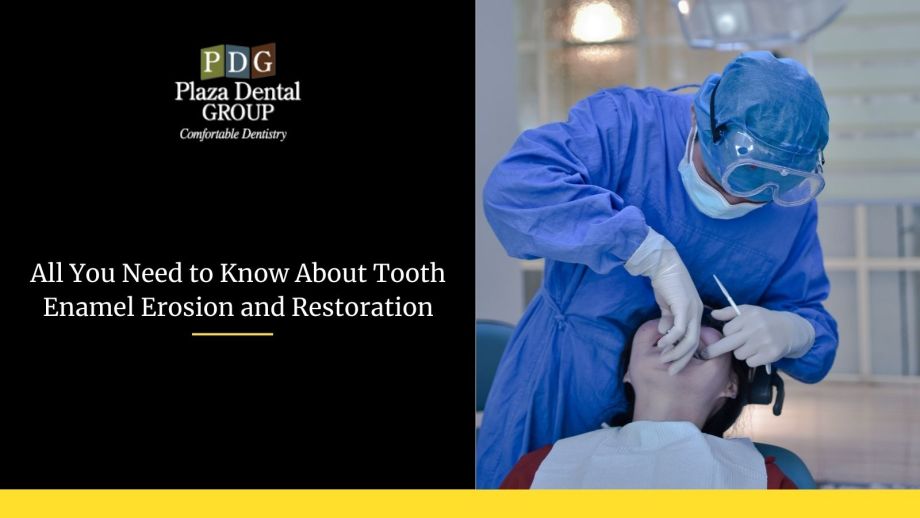Enamel is the outer layer of your teeth, helping to protect your teeth from daily use such as chewing, grinding, biting, crunching, and exposure to foods and other fluids. It also insulates the teeth from extreme temperatures and hazardous chemicals. Enamel is the hardest tissue in the human body, but it is prone to wear and tear over time, causing enamel erosion. Once damaged, tooth enamel cannot be regrown, but you can prevent enamel erosion with regular dental visits and good oral hygiene.
Causes of Enamel Erosion
Factors causing enamel erosion are:
- Acidic fruit drinks
- Excessive soft drink consumption (they are rich in phosphoric and citric acids)
- Sugary and starchy foods
- Gastrointestinal problems
- Dry mouth or low salivary flow
- Certain medications
- Acid reflux disease (GERD)
- Genetics (inherited conditions)
Environmental causes of enamel erosion include:
- Attrition – This happens when you clench or grind your teeth.
- Abfraction – It happens due to stress fractures in the tooth, such as cracks from bending or flexing of the tooth.
- Abrasion – It is the physical wear and tear of the tooth surface resulting from chewing tobacco, brushing too hard, improper flossing, and biting on hard objects.
- Corrosion – Certain medications, GERD, acidic foods, and frequent vomiting erode the tooth, causing enamel erosion.
- Bulimia – An eating disorder associated with binge eating and frequent vomiting erodes tooth enamel and leads to cavities.
Does Plaque Cause Enamel Erosion?
Plaque is a sticky film made of food particles, saliva, bacteria, and other substances. Sometimes, the bacteria in plaque changes food starches into acids, which eat the healthy minerals in the tooth enamel and cause enamel erosion.
Symptoms of Enamel Erosion
The symptoms of enamel erosion vary depending on the stage. However, common signs include:
- Cracks and Chips – Teeth edges become more rough and irregular when enamel erodes.
- Sensitivity – Certain sweets and hot or cold foods may cause a sharp pain in the early stage of enamel erosion. In the later stages, they may cause severe pain.
- Cupping – Indentations occurring on the teeth surface
- Discoloration – Teeth may become yellow when the enamel erodes and more dentin is exposed.
The tooth is prone to cavities and decay when enamel erodes. Small cavities do not cause any significant problems. However, when these cavities grow and infiltrate the tooth, they can adversely impact the nerve fibers and cause an awfully painful abscess or infection.
How to Prevent Enamel Erosion
The following tips can prevent enamel erosion:
- Use fluoride toothpaste to brush twice a day and floss your teeth at least once a day.
- Rinse your teeth daily with a fluoride and antiseptic mouthwash.
- Use a straw when consuming acidic drinks to prevent the liquid from coming in contact with your teeth.
- Avoid acidic foods and beverages. Otherwise, rinse your mouth immediately with water after consuming those.
- Limit your snack intake.
- Chewing sugar-free gum will boost saliva production that strengthens teeth with essential minerals.
- Drink plenty of water, especially if you have a dry mouth.
- Ask your dentist if sealants can prevent enamel erosion and tooth decay.
How Is Enamel Loss Treated?
Treatment for enamel loss depends on its stage and severity. Sometimes, tooth bonding can protect the tooth and increase its appearance. For severe enamel loss, your dentist may recommend covering your tooth with a veneer or crown to protect it from further decay.
If you are looking for an effective treatment for enamel erosion, schedule an appointment with our dentist in West Des Moines.





